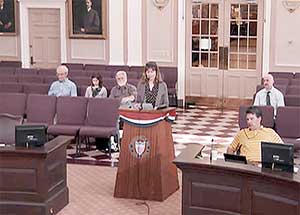
CBA funding distribution and Neighborhood Councils were among the primary issues covered at the latest meeting of the city’s Legislative Matters Committee.
By Jordan Deschenes
Aldermen gathered to discuss the Community Benefits Committee (CBC) ordinance at a Legislative Matters committee meeting last Wednesday, the first such meeting in nearly a month. The purpose of the meeting was to discuss and identify the most prevalent concerns from constituents, advocates, and city officials.
“We don’t come with a set of proposed answers about what this ordinance needs to look like; rather, we come with a core question that needs to be answered collectively,” said Tim Snyder, the city’s Director of Intergovernmental Affairs.
“We came up with a proposal with the intent of trying to figure out a system that we can put in place…to work with the community and not make decisions (solely) as a government,” Snyder said.
Snyder told the committee that a major topic of discussion at recent LOCUS and Civic Advisory Committee meetings has been how to distribute community benefits funds with both discretion and efficiency. He further explained that the draft does not currently establish an adequate process for distributing funds and that the city should take extra time to craft one.
Currently, the city has received its first check of around $200,000 from developer US2 as a result of a CBA included in the recently passed covenant. In the instance that the CBC ordinance is passed this year, the $200,000 and any subsequent increases still cannot be distributed until the D-2 developer obtains a building permit.
According to the Office of Strategic Planning and Development (OSPCD), the developer is not expected to obtain one until the middle of next year.
“So, there won’t be any money to give out for another year, which I think confirms the sense that there isn’t tremendous urgency to get this done sooner,” said Alderman Mark Niedergang in response to the funding timeline.
“Even if we decided by the end of the year, that still allows six months (of discussion) to determine where the initial funds might go.”
Another unresolved question pertaining to Community Benefits funding is whether newly formed Neighborhood Councils should be public or private entities. Neighborhood Councils are expected to have a major role in the prioritization and distribution of CBA funds.
Throughout the drafting process, city officials have been inclined toward establishing councils as private entities, although recent discussions and information have suggested that either decision would have major tradeoffs.
Some of the most significant trade offs as a result of a public decision include those that would hinder the council’s ability to negotiate a community benefits agreement (CBA), receive CBA funds, and hold private meetings.
In contrast, a private entity would be bound to less ethical restrictions that would require it to document recorded minutes and provide sufficient prior notice for upcoming meetings. Most notably, a private neighborhood council would not be bound to the state conflict of interest prohibition.
“To me, the question seems to be who wants to have more authority over distributing the money,” said Alderman Katjana Ballantyne.
“If it’s a private entity, as I understand it, it would have an advisory role. If it’s a public entity, there are more restrictions in terms of ethics; however, they can make the decision in the allocation (of CBA funds).”
A further question taken into consideration for a private decision is the role of the city in handling neighborhood council elections. Eileen McGettigan, special counsel to the OSPCD, confirmed that the Massachusetts Anti-Aid Amendment would limit the city’s assistive role in such elections.
The amendment in question prohibits the use and appropriation of public funds to certain private institutions “for the purpose of founding, maintaining, or aiding” unless the institutions are publically owned and under exclusive public control.
According to alderman at-large Dennis Sullivan, another “common theme” in his constituents’ emails pertaining to neighborhood council elections is the right of all residents to vote in their own respective neighborhoods.
McGettigan explained that the draft ordinance is currently written to allow each neighborhood council to set its own respective geographic limits for representation. She also explained that community benefits would also be used on a citywide level.
“There is the ability when funding recommendations get to the level of the Community Benefits Committee -in other words, the citywide committee- there will be opportunities for certain community benefits funds to be expended for the benefit of residents citywide,” said McGettigan.
“So there’s the neighborhood aspect and there’s also the citywide aspect. The Neighborhood Councils themselves are supposed to delineate exactly what the boundaries are of the areas they represent.”
As a means of answering major questions, Aldermen encourage residents who have any questions and concerns about the CBC ordinance to attend a public hearing on the subject that will be scheduled for early September.












Reader Comments